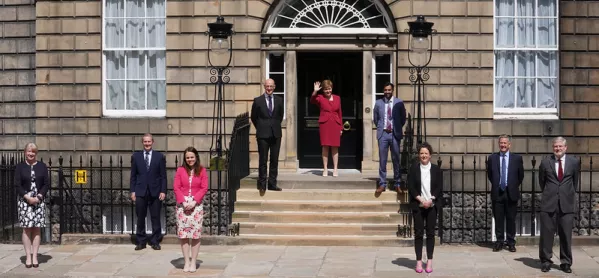Sturgeon’s education priorities for the first 100 days

First minister Nicola Sturgeon has said that the review of Scottish education conducted by the Organisation for Economic Cooperation and Development (OECD) will be published in her new government’s first 100 days.
The publication date of the review, which covers both primary and secondary, has proven controversial after calls for its interim findings to be published ahead of the Scottish Parliament election earlier this month were rejected.
Outlining her plans for the first 100 days of government, Ms Sturgeon told MSPs this afternoon: “In our first 100 days we will also publish the OECD report on Scottish education and start to implement its recommendations.”
Background: Scottish curriculum review to be led by OECD
Related: Government accused of ‘stitch-up’ over OECD review
News: Curriculum for Excellence review is postponed
SNP manifesto: What was the SNP manifesto for education?
Also today: Teacher MP grills Dominic Cummings over Covid handling
She also committed to delivering “one of the major legacies of the last Parliament” - the doubling of free nursery hours for preschool children from August - and to giving councils the first instalment of the new £1 billion Attainment Scotland Fund to close the poverty-related attainment gap.
Controversy over the OECD review of Scottish education
Ms Sturgeon said that, in the government’s first 100 days, councils would receive the first phase of funding to begin to recruit 3,500 additional teachers and classroom assistants. She later clarified that this initial funding would pay for 1,000 teachers and 500 classroom assistants.
Ms Sturgeon added: “We will begin work to make sure all children have access to a laptop or a tablet and take steps to remove charges from core curriculum activities and from music and arts education, including instrumental music tuition.”
There would also be a £20 million programme of summer activities for children and the rollout of free school meals for all primary pupils would begin, starting with P4 pupils, she said.
Labour leader Anas Sarwar, however, said the government needed to be “bolder and more ambitious” and called on the government to commit in the first 100 days to deliver a jobs guarantee scheme for young people and the long-term unemployed; to double the Scottish Child Payment of £10 a week (which the SNP, in its manifesto, promised to do by the end of the Parliament); and to take urgent action to avoid a repeat of the “SQA exams fiasco”.
The Scottish Conservatives’ education spokesperson, Oliver Mundell, meanwhile questioned why the Scottish government was not making the funding available now to employ all 3,500 teachers and classroom assistants, given the disruption to learning caused by the coronavirus.
Ms Sturgeon said the government would “consider how quickly we make the funding available for the 3,500 teachers and classroom assistants” - but added that it was not just about funding, it was also about “how quickly it is practically possible to recruit teachers”.
The OECD’s review of Curriculum for Excellence was initially set up to examine just the three final years of secondary when students take their qualifications. However, a defeat in the Scottish Parliament last year forced the Scottish government to change its plans and carry out not just a review of the final three years of secondary school (S4-6, the “senior phase”) but “a full review of the broad general education [up to S3] and how it articulates with the senior phase”.
In February 2020, before the impact of the coronavirus in Scotland became clear, the Scottish government said the review would start immediately, concluding in February 2021, with a report published “at a later date”. But in April this year, John Swinney, who was then education secretary, announced that the publication of the final report had been delayed until June 2021 due to the pandemic.
However, it was revealed ahead of the election that a first draft of the review had been delivered, prompting opposition politicians to accuse the Scottish government of a “stitch-up” for failing to reveal the findings ahead of the election.
You need a Tes subscription to read this article
Subscribe now to read this article and get other subscriber-only content:
- Unlimited access to all Tes magazine content
- Exclusive subscriber-only stories
- Award-winning email newsletters
Already a subscriber? Log in
You need a subscription to read this article
Subscribe now to read this article and get other subscriber-only content, including:
- Unlimited access to all Tes magazine content
- Exclusive subscriber-only stories
- Award-winning email newsletters



